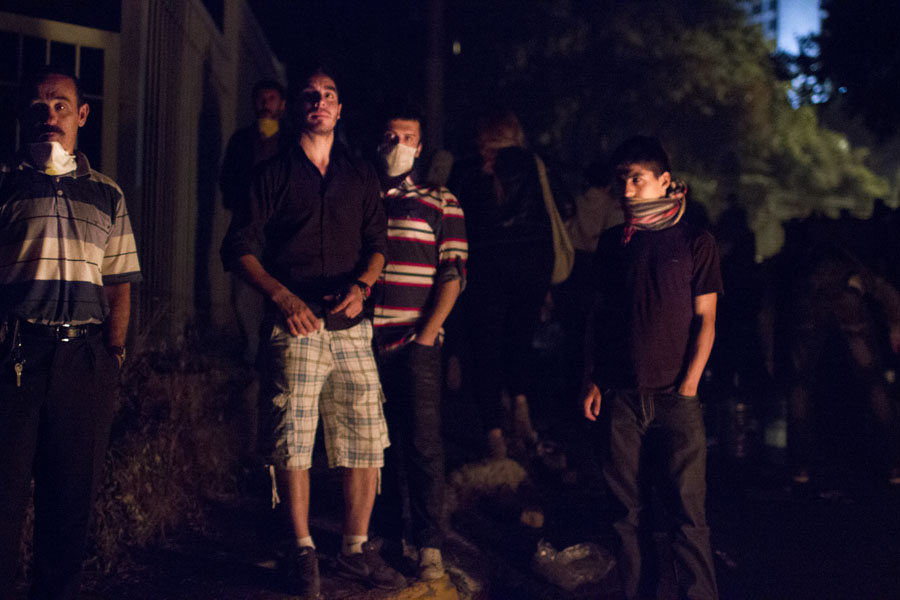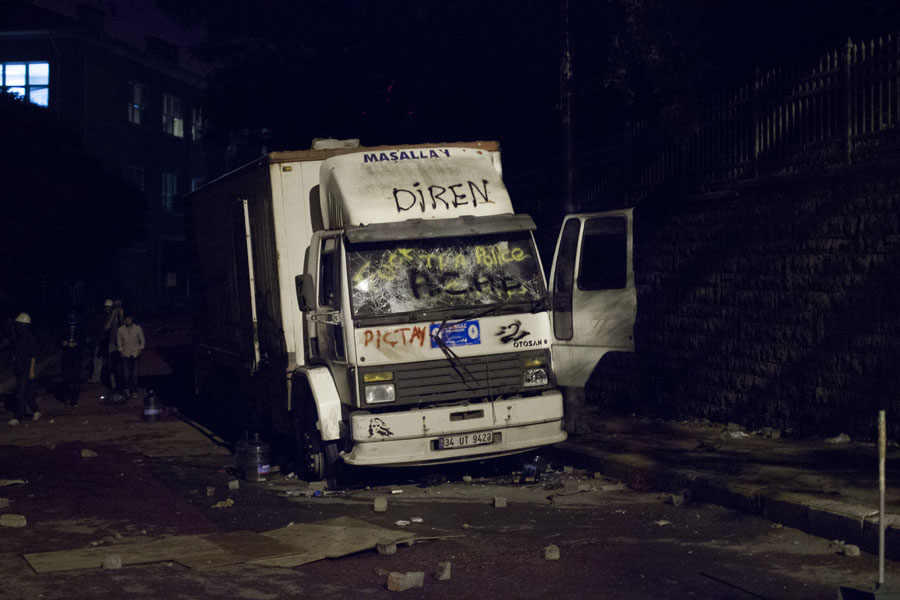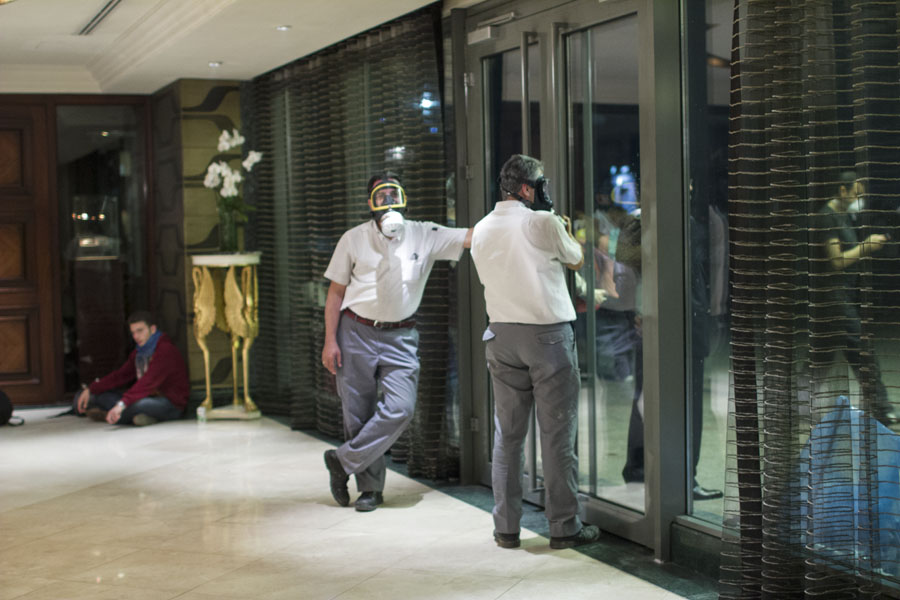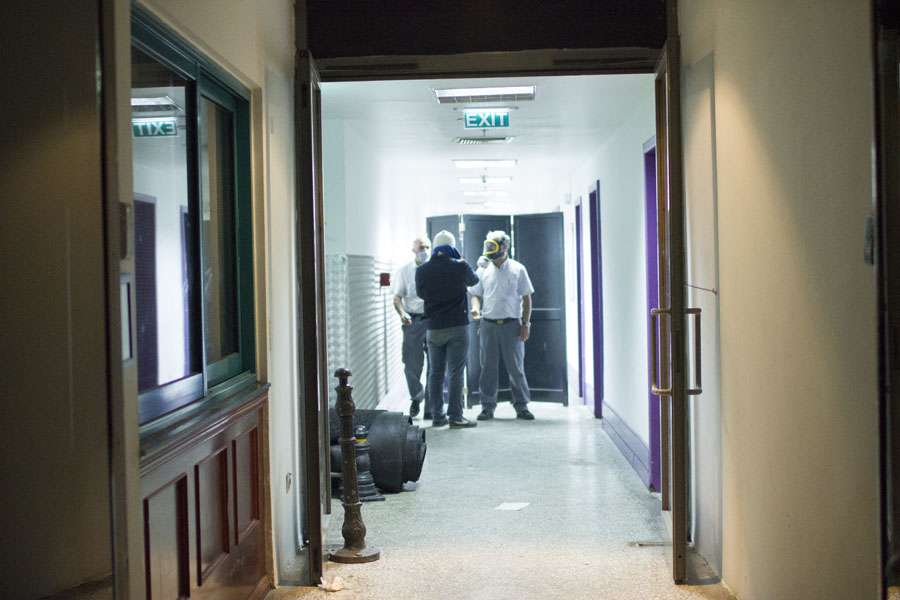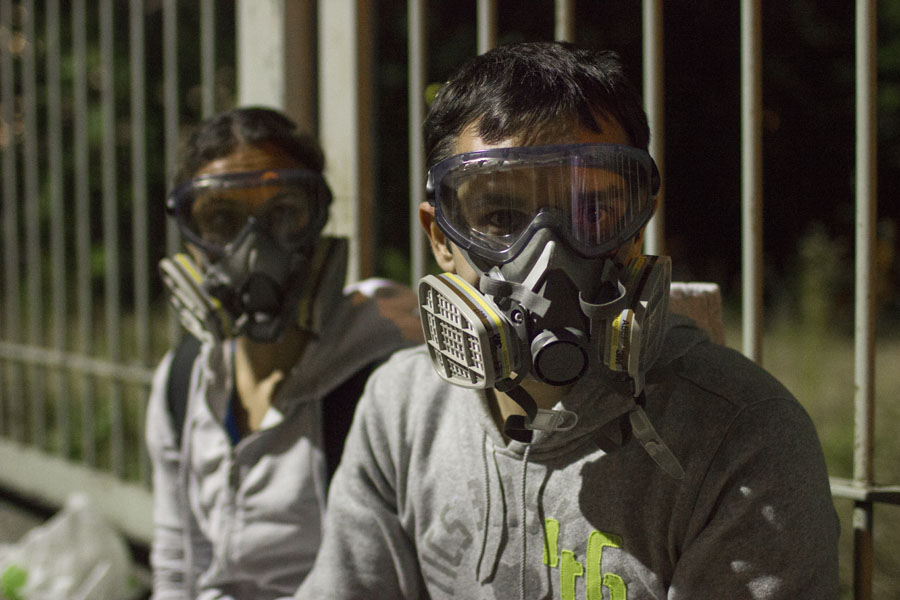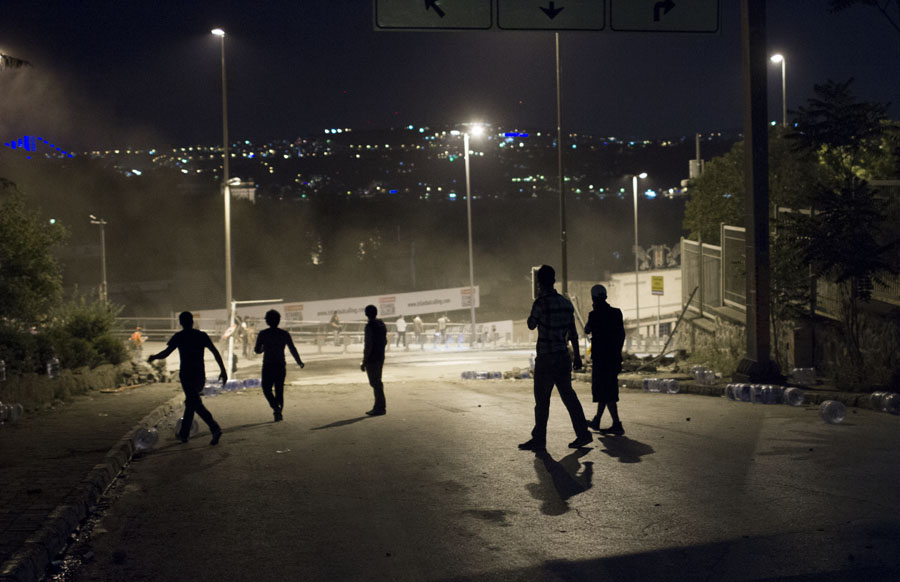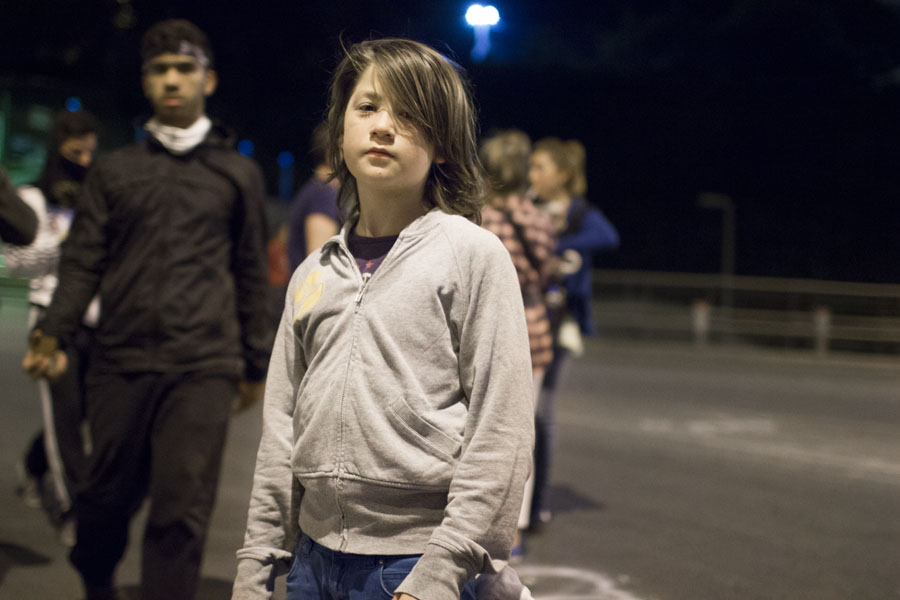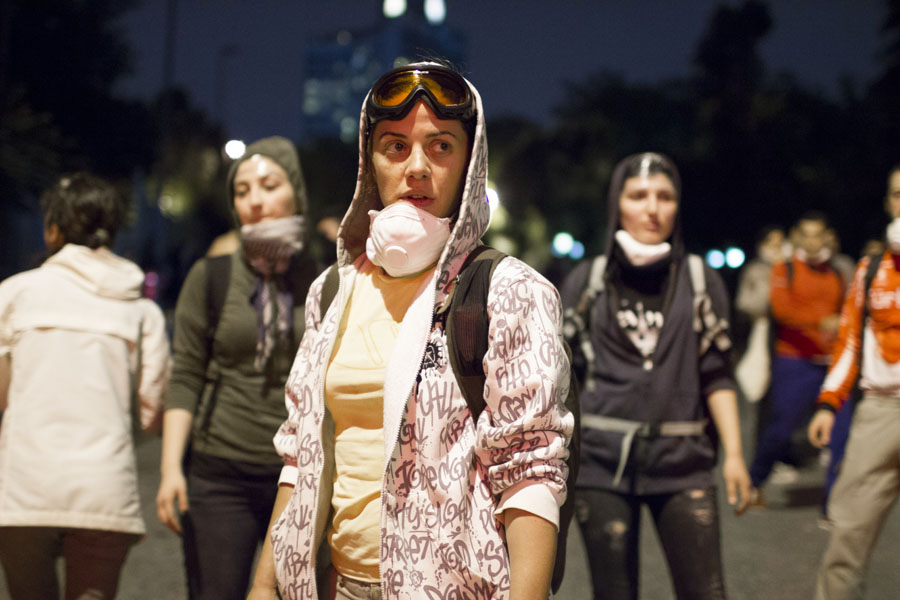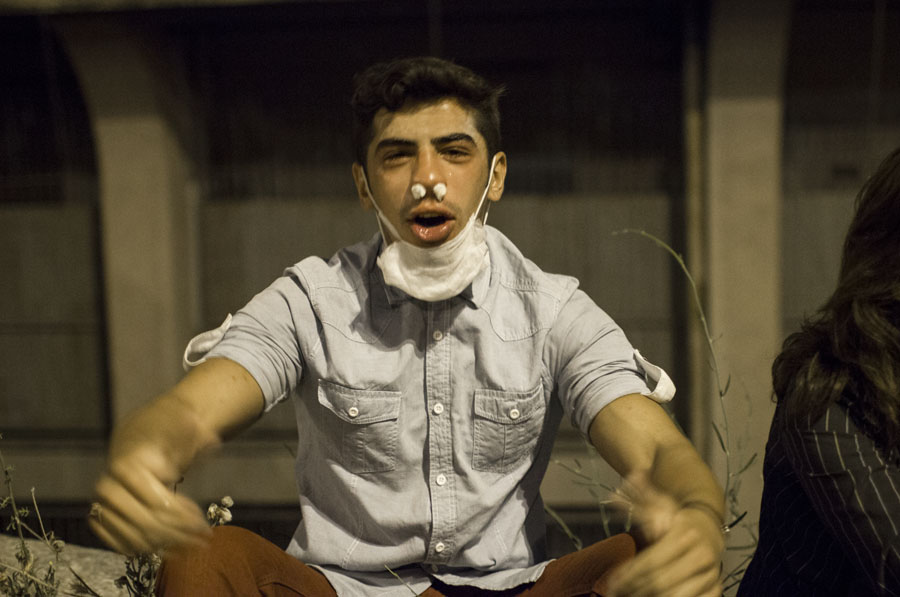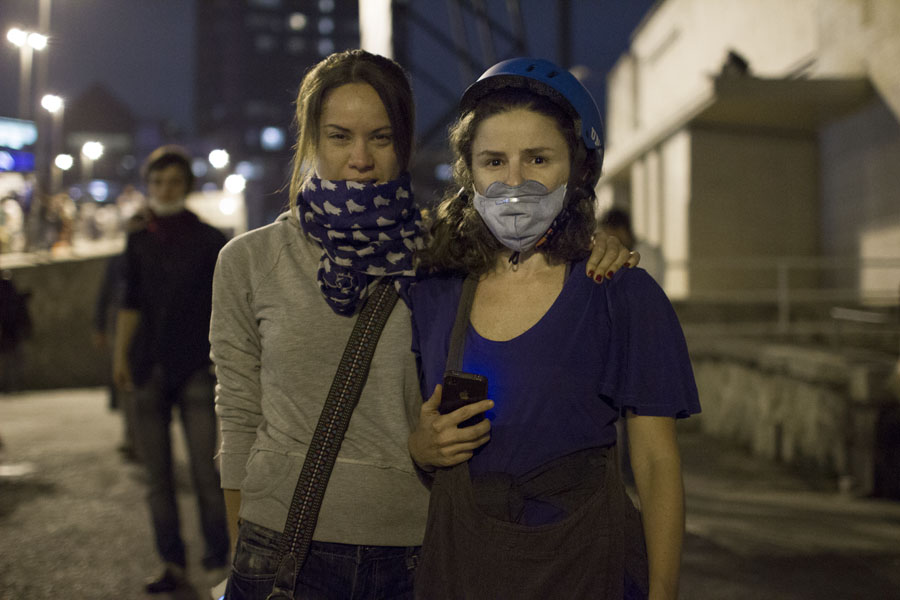The Istanbul team heads into the clouds of gas. It starts off pretty well. Photography by May Castelnuovo
Click here for the full series.
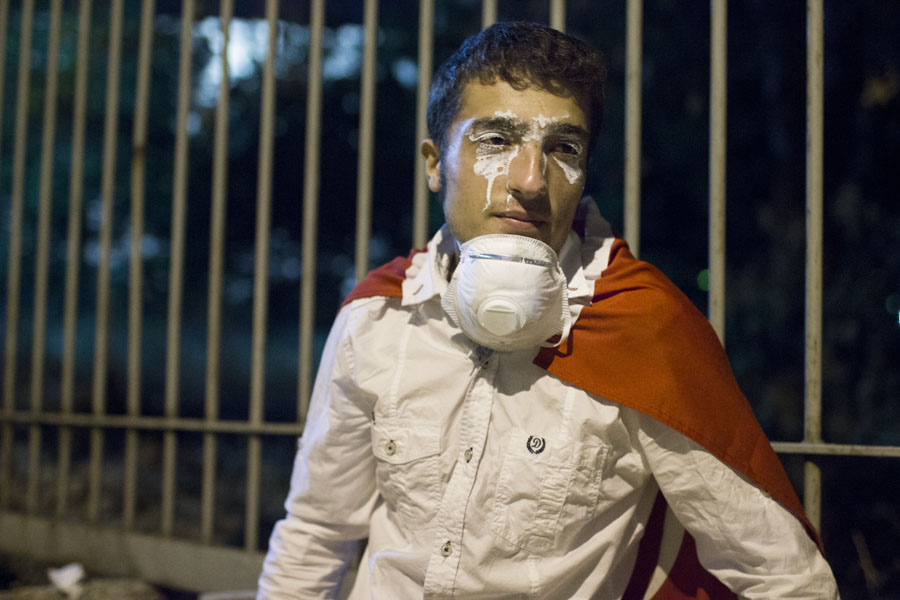
ISTANBUL — On Sunday night, newly reunited after the lost kidney scare, May and I went to dine with two compatriots. One was Or Heller, Channel 10’s man, whom we tried to reach earlier, and Anshel Pfeffer, who reports here for Haaretz. I bit into the delicious Adana köfte and thought of Ruthie, who loves Istanbul so much, and would have come here if not for her work. What should I bring her when I return? Adana doesn’t travel well, and anyway she’s a vegetarian except for when she travels.
Thank Goodness for Anshel, who came up with an idea that may provide a nice solid memento: a tear gas canister. “I don’t know about you,” he said, “but I’m headed for Beşiktaş. Here everything is so sweet, there – the police are present. There are clashes.”
I did know about me. I wasn’t coming. Ebu Zer and Soner are hosting us and I promised them we would arrive before 10:30, but May’s eyes were agleam. She wanted those shots. How to argue with a creative spirit? I conceded, but warned that we would only stay for half an hour.
The street outside the restaurant was full of relaxed tourists and the buzz of restaurant hosts trying to lure them in. Nothing at all betrayed that two blocks away was a graveyard of overturned police vehicles. We emerged out of the hotel district, skirted the overturned cars and continued downhill, towards the Bosphorus shores and the Dolmabahçe Palace, a grand piece of Ottoman waterfront property, in which Erdoğan has an office.
On the hillside rising above the palace is the famous football stadium of Beşiktaş. As we approached, eyes already teary, we saw that stadium being taken apart before our eyes. Demonstrators were tearing off fences and other elements of its exterior.
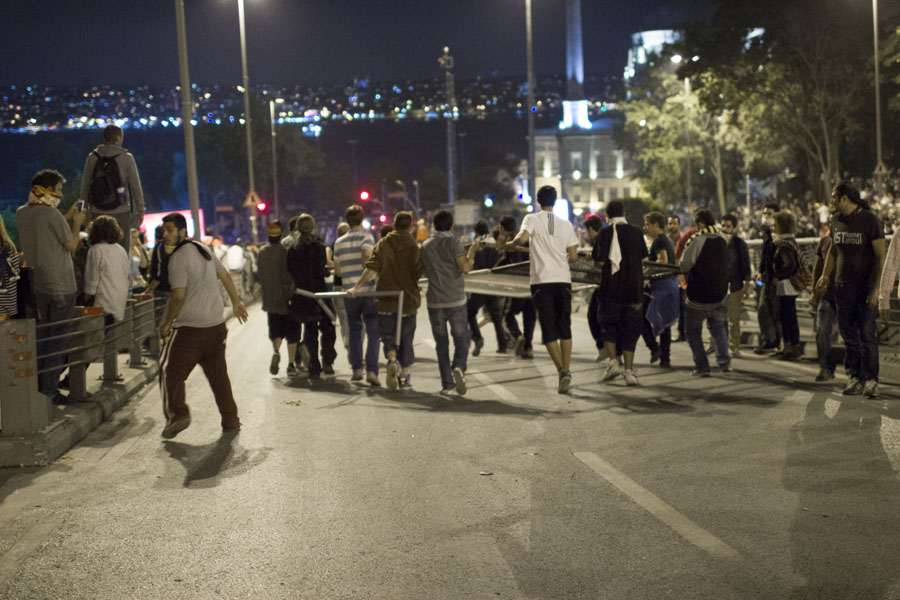
A cloud of teargas loomed past them at the foot of the hill. We descended as far as we could amongst the hordes of young, masked rebels but were chased back again and again by the torturous sensation.
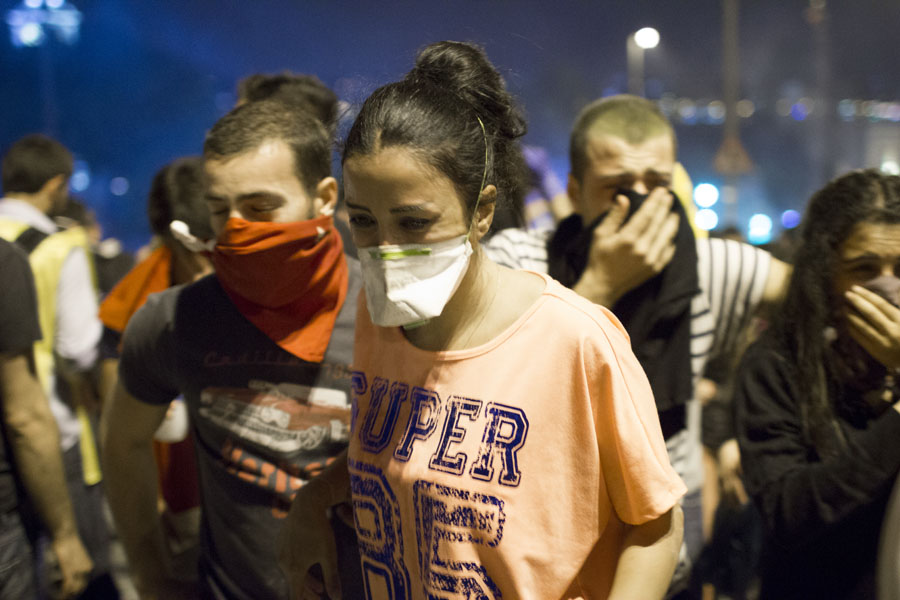
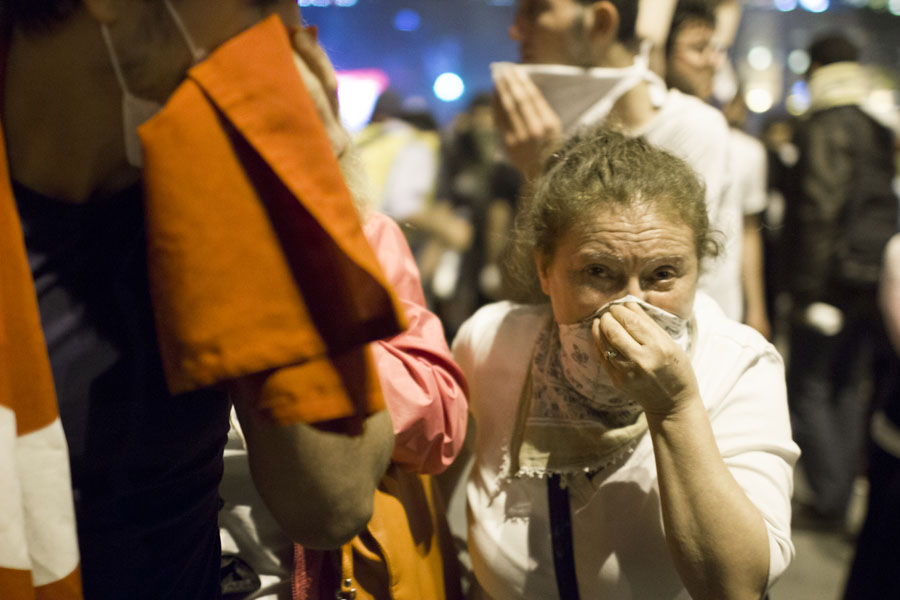
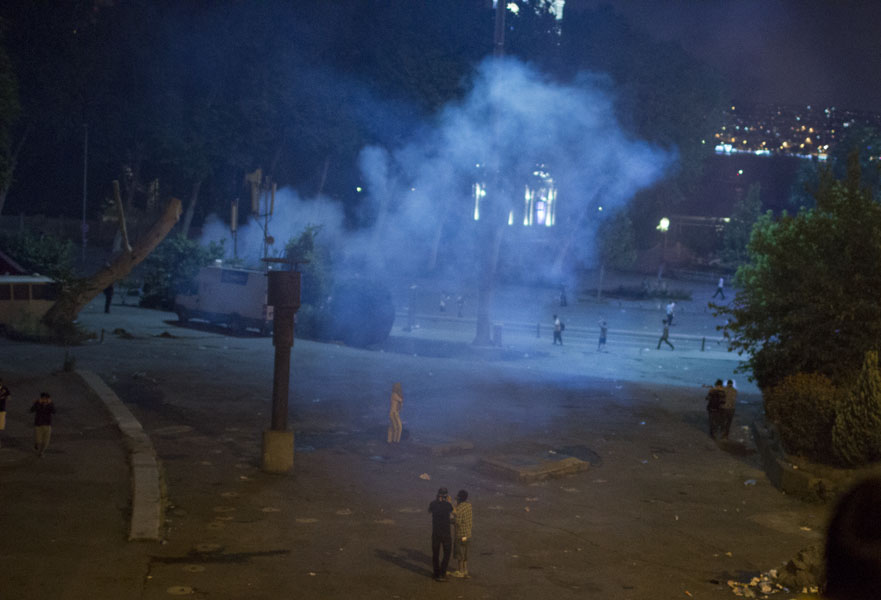
All of the comparisons I made in the previous post became void. The easygoing daytime scene was comparable to Israel’s tent protests, but what was going on before my teary eyes recalled another, very different struggle taking place in the same land — the Palestinian one. Beşiktaş has turned into an enormous Nabi Saleh.
Well, Nabi Saleh with a certain Parisian je ne sais quoi. Directly below us, demonstrators were taking the sidewalk apart to build a barricade. A barricade made of paving stones? 1968!
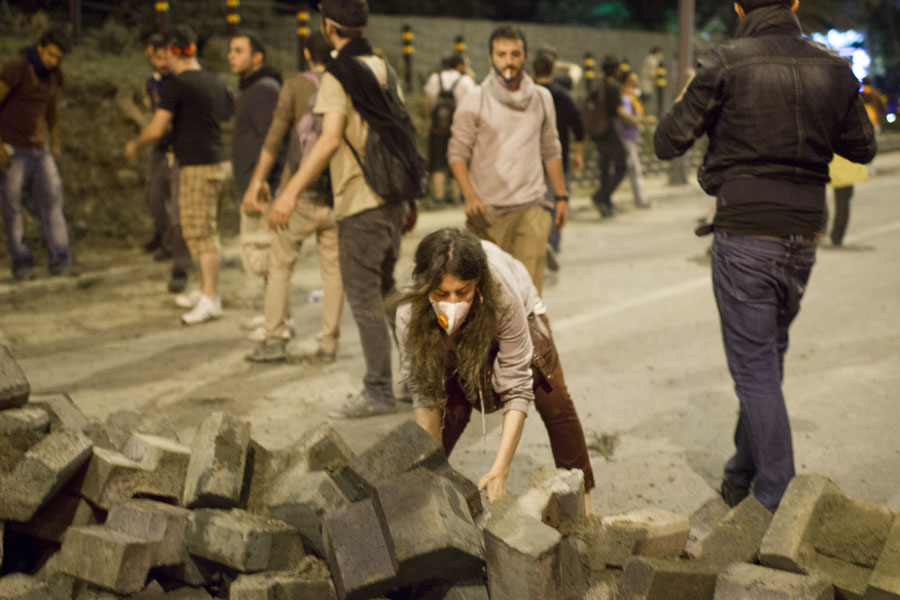
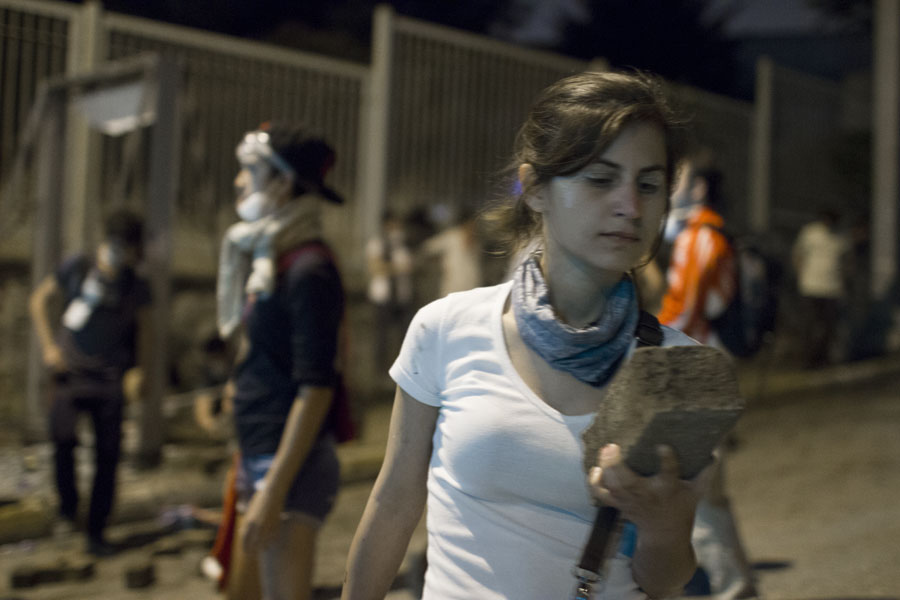
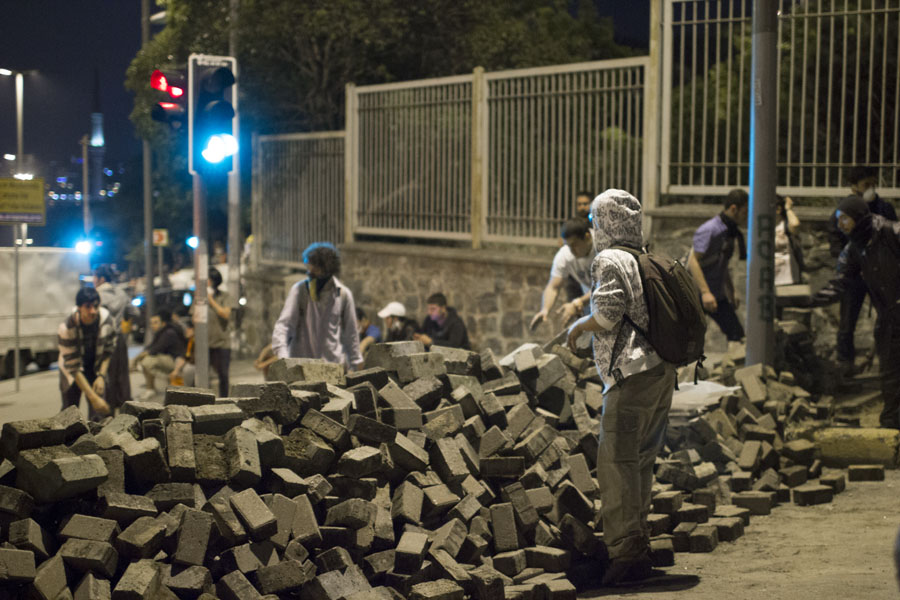
Fulfilling an old dream, I joined the workforce and kicked a few bricks down toward the rising wall. The feeling was intoxicating. I am Danny the Red! I am Mordechai Anielewicz! I am Spartacus! I am a pretentious tourist performing an act of no substance whatsoever.
Or could it be significant. This is my region. This is my world. What happens in Turkey matters. We are all affected, somehow, by the existence of this barricade and will all be affected by its removal. I kicked another brick, then ventured downhill again, then climbed back up, unable to see, my face burning, seeking out the kind people who spray you with a mix of milk, lemon and antioxidants. Then realized we had lost Anshel.
The hell with it. He’ll get by. Who wouldn’t in such a friendly scene? Even the most obvious outsider is taken for a friend here, so long as he is not in uniform and shows a hint of solidarity. A luxury car passed by and was stopped by the mob. The driver calmly opened his trunk and allowed for a six pack of water bottles to be snatched out. He was sent off to the accompaniment of cheers.
Boom! Clang! Great noises and grand billows rose from the road to north of the stadium. An elaborate system of defense was set up there, comprised of two enormous barricades made mostly of broken billboard frames. Everyone was moving past them now, yelling some Turkish word we couldn’t understand. We rushed along, then realizing that the forward barricade was rushing with us. That is, it was being moved further ahead, a hundred meters, to broaden the bounds of the rebel held free state of Taksim. It is rebuild directly at the foot of the police encampment, at the very gates of the palace.
The process was astounding. Two by two they came, girls and guys, carrying the billboard frames and chunks of stadium into the cloud while onlookers cheered from behind their masks. At last, the barricade stood tall. Some brave souls climbed over it, in the thick of the cloud, waving their arms in a scene out of Les Misérables, only with no guns. Later we learned that Ebu Zer was among them, and rated this the finest experience of his life.
That was last night. Tonight is different.
We can feel it from the first moment. We decided to head directly to Beşiktaş tonight, after dinner, and were expecting a similar scene. But there’s nobody here, nobody except for the cops. The air is an atrocity.
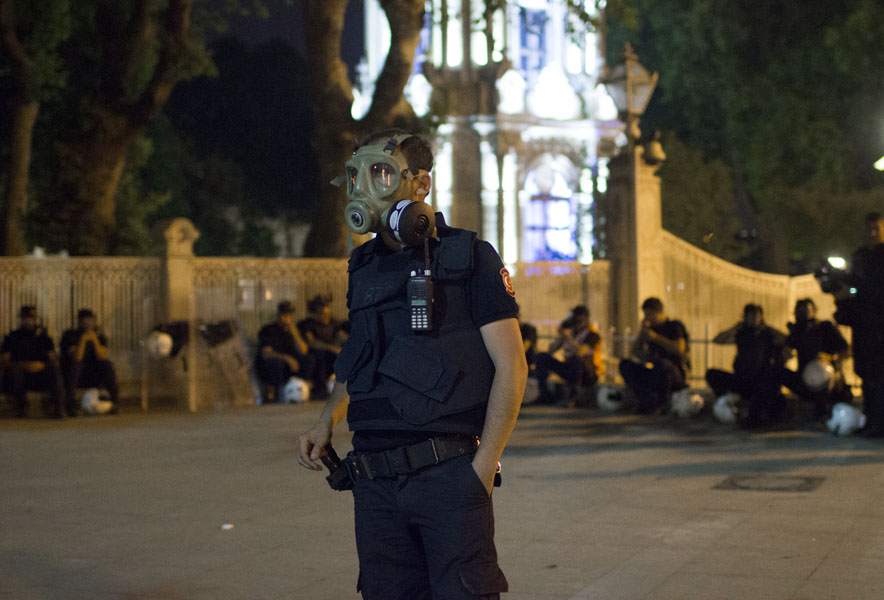
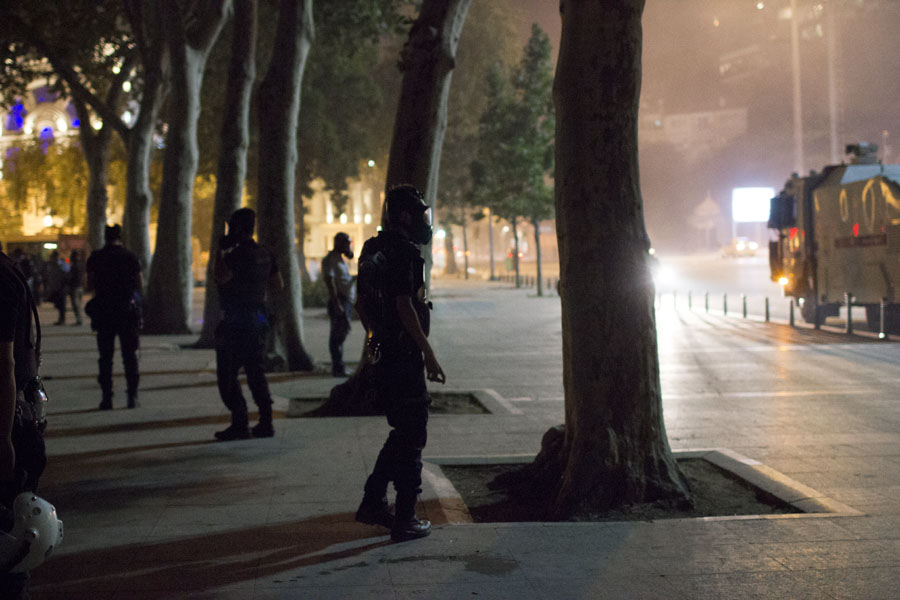
We hasten to buy a new pair of masks from a street vendor and head to the palace’s gates to ask the policemen what happened.
A straight answer is nowhere to be found, but we do get something of a policeman’s perspective. Officer Furkan, who speaks to us, is exhausted. He hasn’t seen his home in four days. “All policemen understand the protesters,” he says, “but they don’t demonstrate the right way. They are acting like terrorists.”
“The police too, uh, have been blamed for excessive violence,” I comment gently.
“We always try to communicate. We speak to them through loudspeakers, but they never listen. They never back up.”
Soon we learn that Furkan and his friends have just issued the harshest gas attack of the entire week. Last night the demonstrators won. Tonight the police kicked off with a blast. They pushed the mob up the hill, all the way past the stadium and to the very cusp of Taksim.
When we climb up in that direction, bystanders warn us that the road is “dangerous.” It is certainly dark. The street lights have gone out. We pass the barricade I helped construct; it is ruined, broken apart right through the middle. Beyond it, some large, empty mineral water containers and a few gas canisters litter the asphalt. Here is the gift for Ruthie! I pick one up and read the label. It was produced by Nonlethal Technologies in Homer City, PA. There’s another one lying nearby. As I lift it, trying to decide which of the two is less damaged and would make a finer gift, I realize it is not empty. A drop of thick liquid pours out of it onto the ground, and I fall apart.
My face! My face is screaming! I can’t breathe, can’t swallow, can’t think. I must get out of here to someplace where I can wash myself.
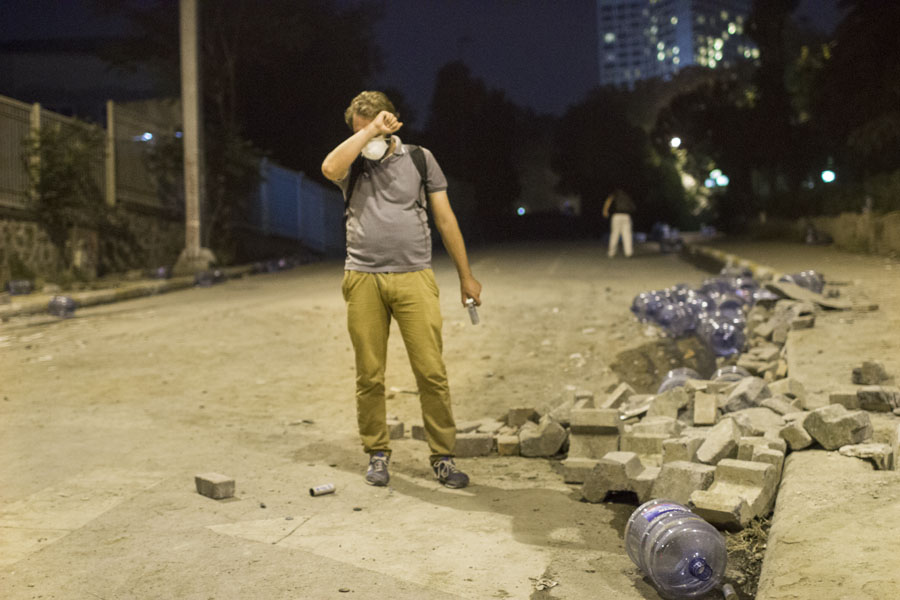
May climbs up the dark street with me. There are people ahead. It’s the demonstrators’ front line. They are standing in the dark, but a helicopter shines its beam of light on them. On us. What are those plastic things on the ground everywhere? The band of the most devout apparently looted a truck full of five-gallon mineral water containers and are rolling them onto the road. They are pouring oil to stall police vehicles should they approach. They are lighting firecrackers and throwing them. They are having a wild time, and I’m not even human.
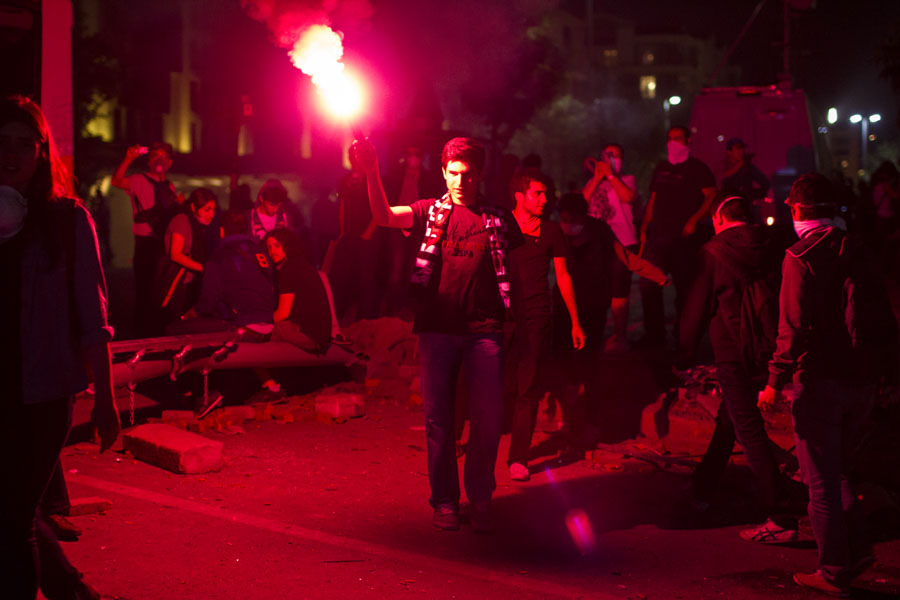
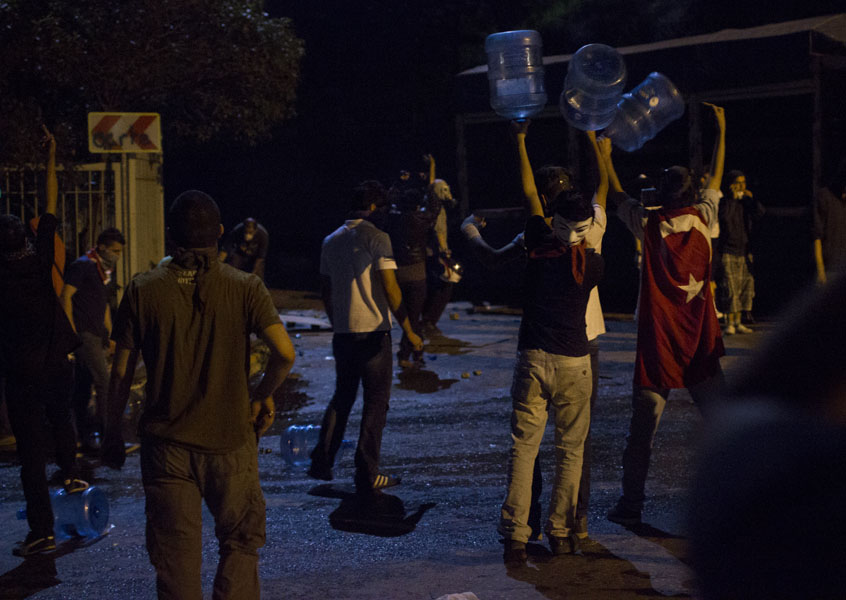
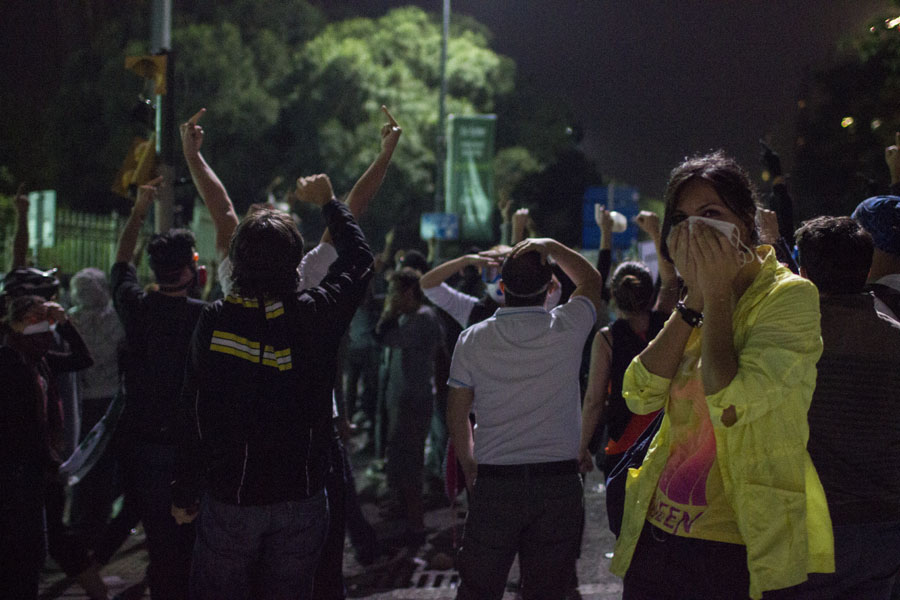
Further up the hill is the InterContinental Hotel, so full of light. We enter it and find that the last attack has caused all barriers to fall. Surgical masks are now not only present in the tourist environment, scores of them are to be found under the very chandeliers of the InterContinental’s lobby. The place looks like the Winter Palace moments after the capture of the Tsar. That’s nice. I begin to calm down.
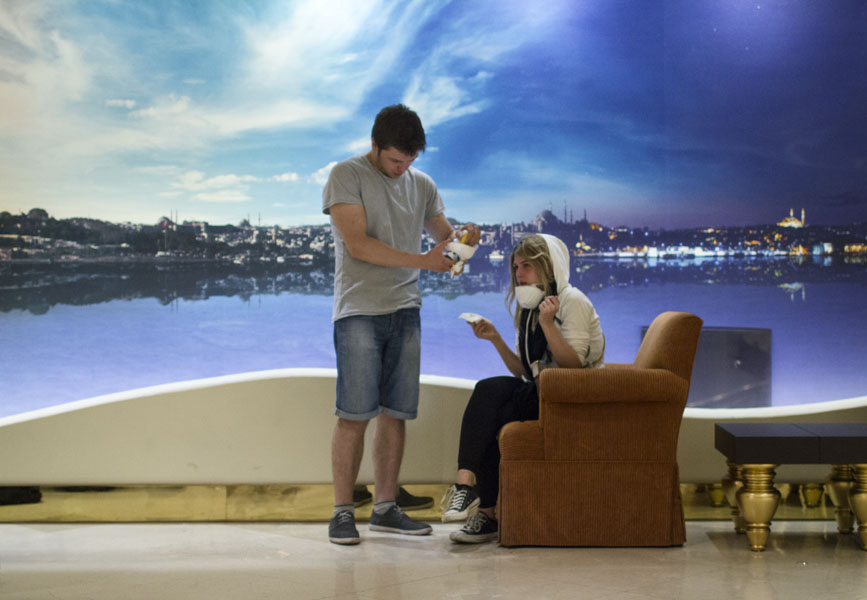
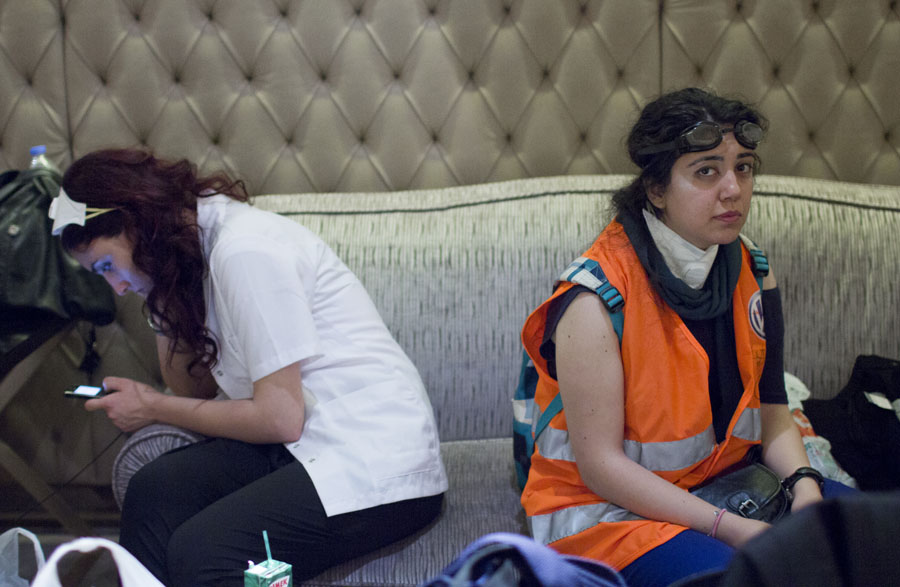
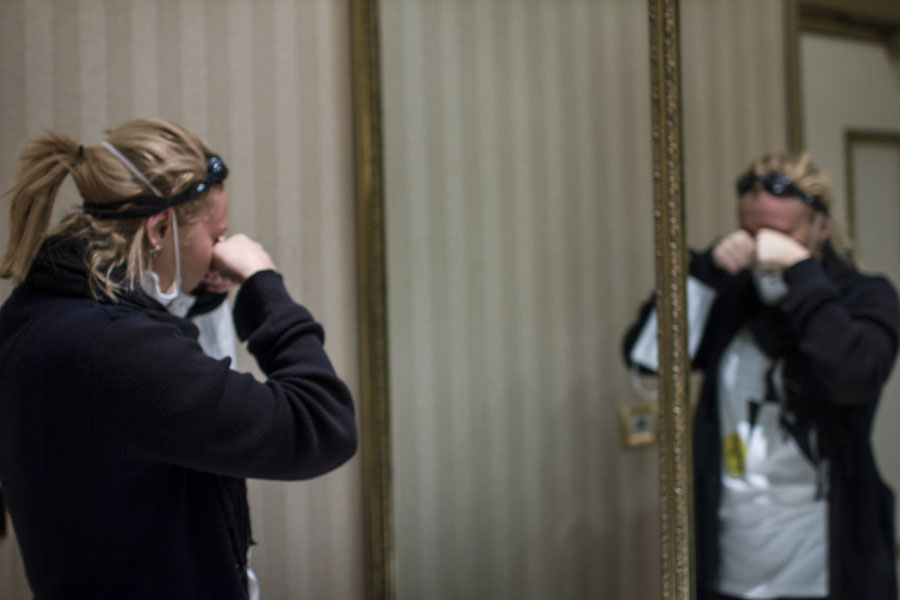
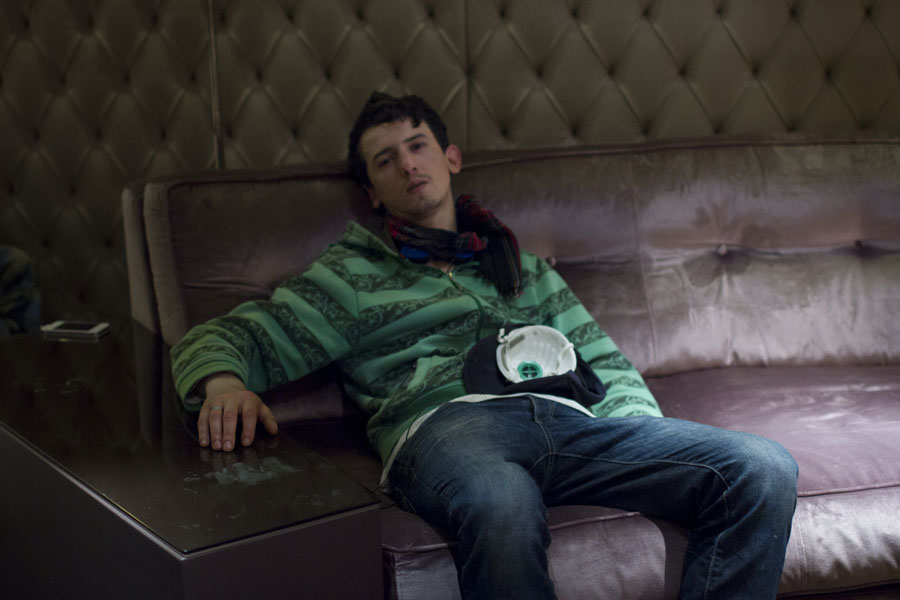
Anshel is here too. We haven’t seen him in 24 hours. He brings us to his own hotel room across the square, where I may recover. We are welcome to linger but May is electrified. She wants to go back out. There are shots she didn’t get. Once I regain myself, a compromise is reached: we’ll skirt the zone, stay away from the front lines and won’t linger for too long.
So that is what we do. We reach the first barricade at the edge of Taksim, which is now aflame, and stay there.
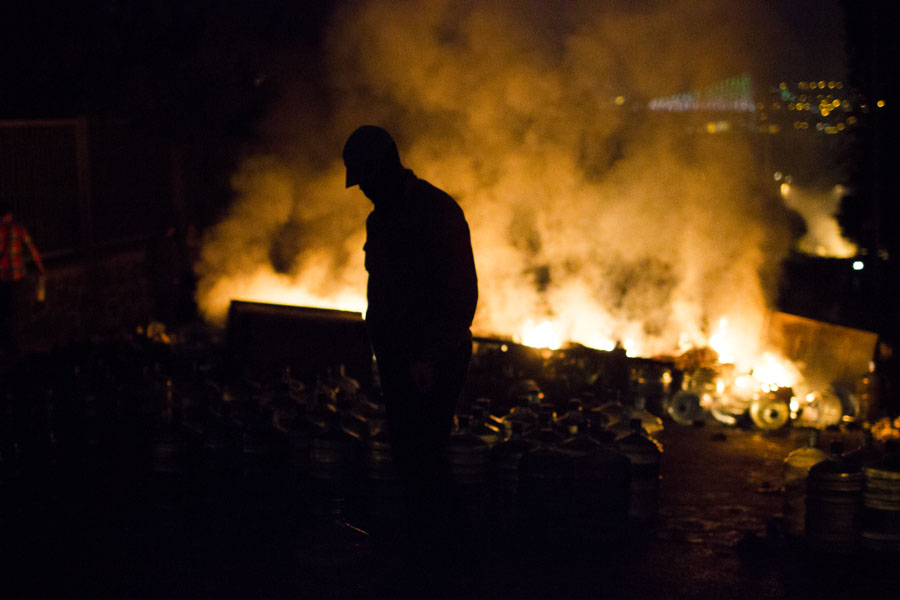
We stay there even when hundreds of terrified people are climbing up in our direction, escaping something invisible. May is in video mode. She is filming them escaping. She is overcoming her own need to escape. “Let’s scram!” I yell.
It is too late. We have been attacked by pepper spray. It makes tear gas feel like frankincense. We literally fall to the sidewalk, coughing, choking. I sit there, shocked, a long trail of snot dangling down my nose. Activists stop by to offer us various magic cures, but nothing works. This is the real thing, the one that stays with you.
